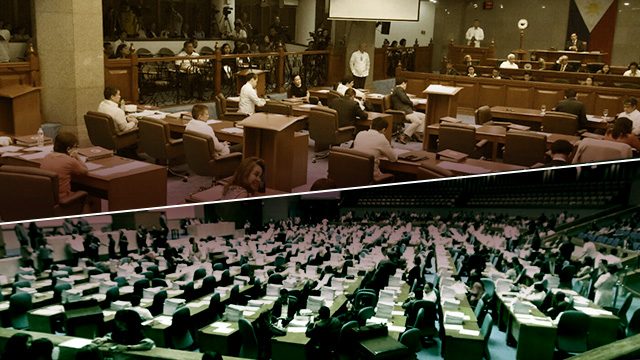SUMMARY
This is AI generated summarization, which may have errors. For context, always refer to the full article.


MANILA, Philippines – The 2019 midterm elections saw the ruling party PDP-Laban and its allies take both the Senate and the House, virtually ensuring a smoother interaction between President Rodrigo Duterte and the legislative branch for the second half of his term.
As the winning senators and representatives began their terms on Sunday, June 30, here are some details about the composition of the 18th Congress.
There are 24 seats in the Senate, half of which were up for grabs in the 2019 polls. Meanwhile, there are currently 304 seats in the House of Representatives.
Not yet included in the counts below are the representatives of Duterte Youth and Senior Citizens party-list groups, after petitions were filed to settle which nominee should rightfully take the House seat each won in the 2019 race.
By political party
In the Senate, PDP-Laban – the party of President Rodrigo Duterte – has 5 members. Three of them were newly-elected in 2019, joining Manny Pacquiao and the reelected Aquilino Pimentel III.
The Nacionalista Party (NP) has 4 members, while the Nationalist People’s Coalition (NPC) has 3. The opposition Liberal Party (LP) has 3 members left, while there are at least 3 independent senators.
PDP-Laban also has the biggest contingent in the House, with 84 members, according to their candidacy forms when they ran in the 2019 polls.
NP has 42 House members, followed by NPC with 36 members, and National Unity Party with 25 members. These parties have been allied with PDP-Laban since Duterte’s election in 2016, as part of the “supermajority” in the House.
The party-list bloc has 61 seats, or 20% of the total House membership, as stated in the Constitution.
LP only has 18 members in the House.
By gender
There are 7 female senators in the 18th Congress, the biggest number in the Senate’s history. They are reelectionists Cynthia Villar, Grace Poe, and Nancy Binay, returning senator Pia Cayetano, neophyte senator Imee Marcos, and 2016 winners Risa Hontiveros and Leila de Lima.
In the House, around 7 out of 10 representatives are male, numbering at least 215. At least 87 House members are female, around the same number as when the 17th Congress started.
Oldest, youngest lawmakers
In the Senate, the average age is 56, while it is 52 years old in the House. When the 17th Congress started, the average age was 52 in both the Senate and the House.
The oldest Senate member remains to be Senator Richard Gordon, at 73 years and 10 months as of June 30. The youngest is still Senator Pacquiao, at 40 years old.
The oldest congressman in the House is Cebu 1st District Representative Eduardo Gullas, at 88 years old. He succeeded his grandson Gerald Anthony Gullas Jr, who served for two terms. The elder Gullas himself was a former lawmaker of his district, serving two non-consecutive 3 terms.
Joining Gullas in the top 5 oldest House members are reelected and returning lawmakers: LPGMA Representative Rodolfo Albano Jr (at 85 years old), Pangasinan 3rd District congresswoman Rose Marie Arenas (80), Zamboanga del Norte 3rd District Representative Isagani Amatong (78), and Cebu City 1st District congressman Raul del Mar (78).
Iloilo 4th District Representative Braeden John Biron is the youngest lawmaker, at 25 years and 5 months. He replaced his father Ferjenel Biron, who lost in his gubernatorial bid in Iloilo in the 2019 polls.
Following the younger Biron are Cagayan 2nd District Representative Samantha Louise Vargas Alfonso, Ang Probinsyano congressman Alfred delos Santos, Isabela 6th District Representative Faustino Dy V, and Isabela 4th District congresswoman Alyssa Sheena Tan, who are all 26 years old as of June 30.
Like Biron, Vargas, Alfonso and Dy came from entrenched political dynasties in their respective provinces. Tan is related to Mayor Joseph Tan of Santiago City, Isabela.
According to the Constitution, senators should be at least 35 years old and House members at least 25 years old on election day.
Reelectionists, newbies
In the 2019 polls, 5 reelectionist senators won, 3 are returning senators, and 4 are neophytes. Among the senators elected in 2016, 3 are on their second and last term as senator.
At least 121 district congressmen and 21 party-list representatives were reelected in 2019.
Among these successful House reelectionists, at least 89 are on their 2nd term, while 51 won their 3rd and last term. (The actual number of terms of two party list representatives, Raymond Democrito Mendoza of TUCP and Sharon Garin of AAMBIS-OWA, are unclear as of this writing.)
Among the 160 first-term congressmen, at least 65 replaced their relatives in a political dynasty. Meanwhile, at least 39 of these first-termers have previously served in the House.
For this story, we define one term as 3-year stints (or in the case of senators, 6-year stints) that were completed without interruption.
Biggest win, slimmest victories
Excluding 34 unopposed candidates, the district representative with the biggest margin of victory was Davao City 1st District congressman and presidential son Paolo Duterte. He got 96.46% of the votes versus his two opponents.
Lanao del Sur 2nd District congressman Yasser Balindong got only 25.36% of the votes among 5 candidates, the slimmest margin among elected district representatives.
However, the slimmest lead – or the smallest difference in the share of votes between the top two candidates – was obtained by Manila 5th District Representative Cristal Bagatsing. She got 50.42% of the votes against Ali Atienza, who obtained 49.58%, for a lead of only 0.83%. – Rappler.com
Add a comment
How does this make you feel?
There are no comments yet. Add your comment to start the conversation.